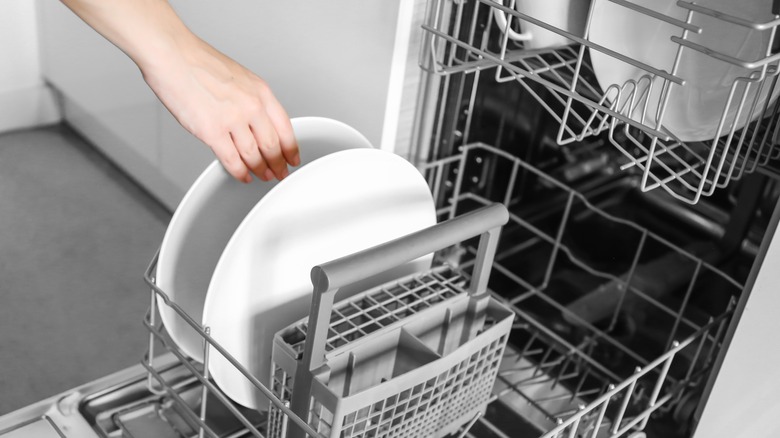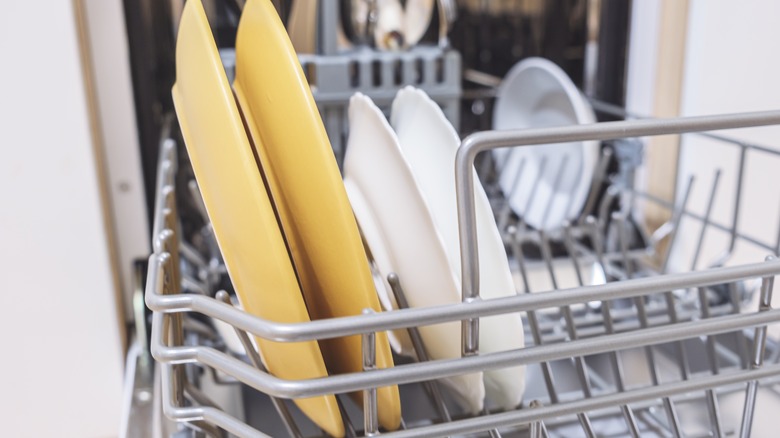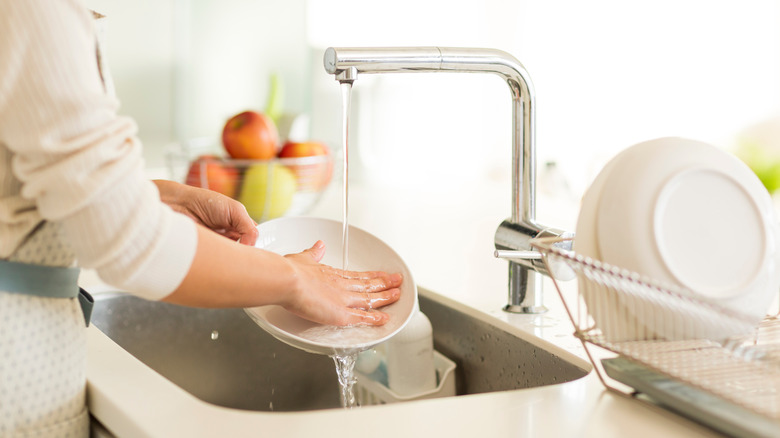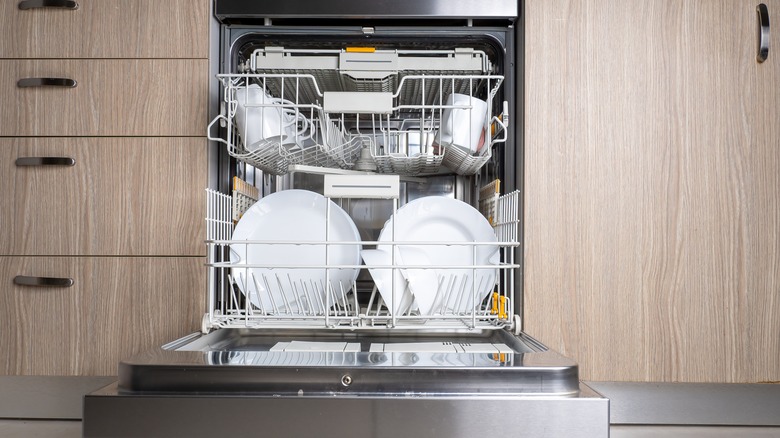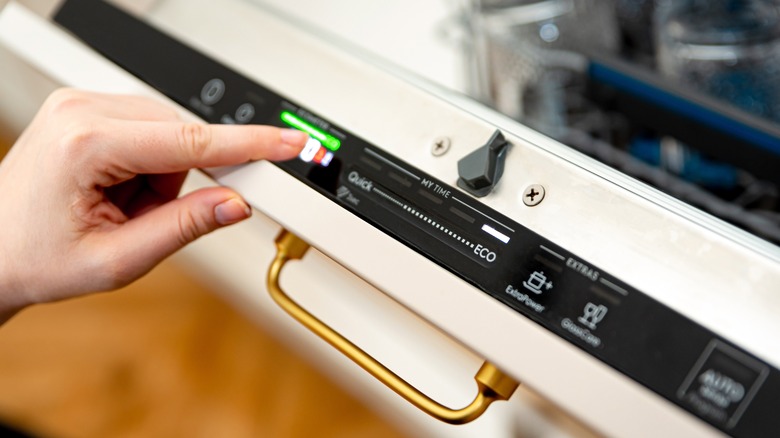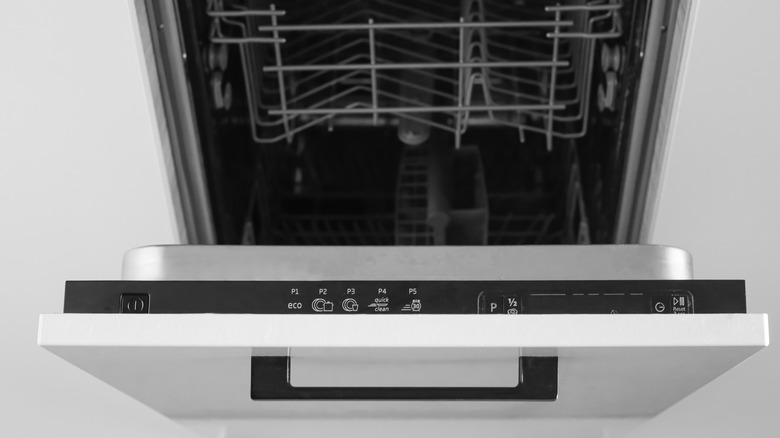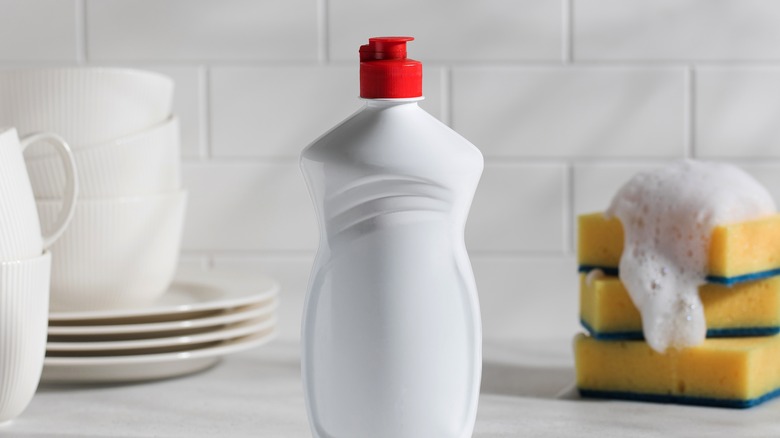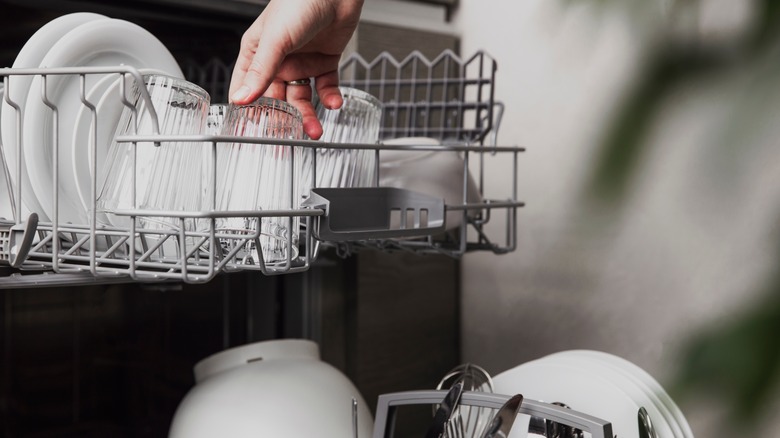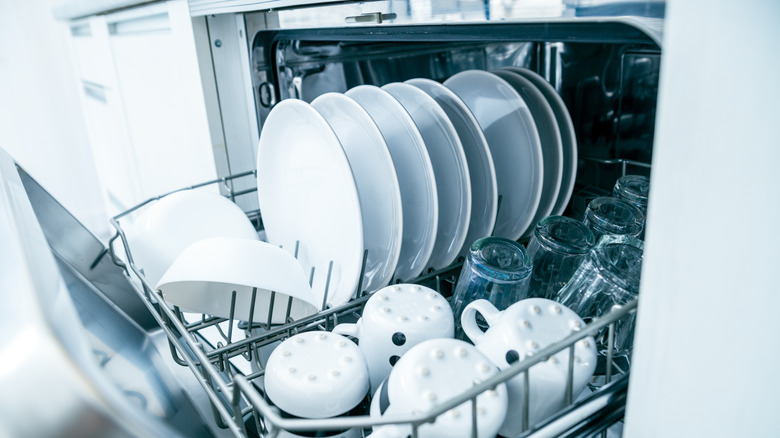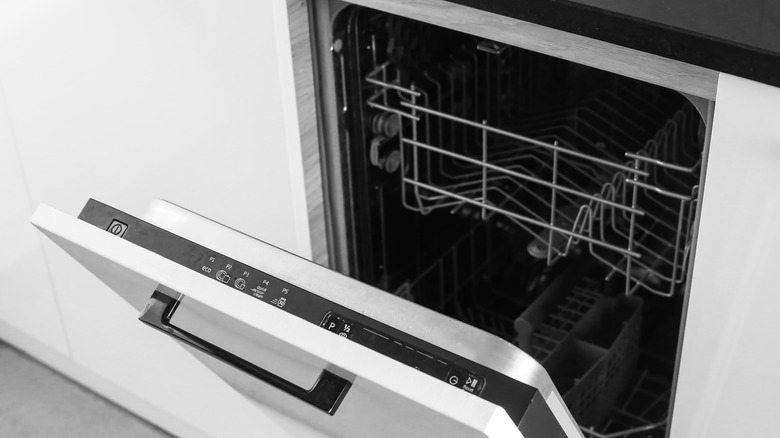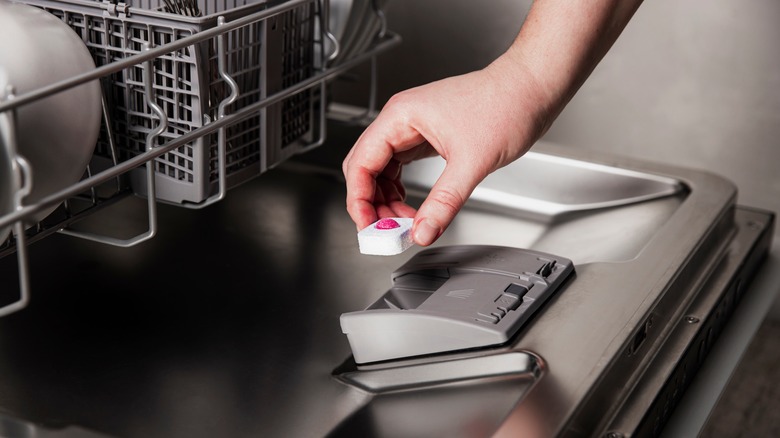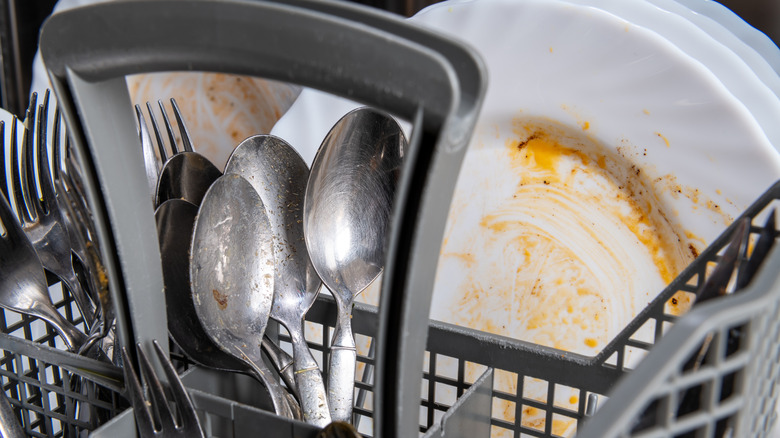11 Essential Tips For Loading Your Dishwasher
If you have a dishwasher at home, you know how nice it is to place everything in there and let this machine work its magic. Afterward, all you need to do is unload and marvel at how your hands aren't dried out from being immersed in hot, soapy water. Yes, these machines are pretty incredible and worth every penny, if you ask us. You can worry less about getting clean dishes and more about enjoying the food that's on them.
But a dishwasher needs to be loaded correctly in order to work at its highest potential. When it's not loaded right, your dishes can come out still dirty, or wet, or there can be a bigger risk to the machine altogether. We have compiled a helpful list to ensure no issues arise when using your dishwasher and you simply enjoy sparkling clean dishes instead. Here are our essential tips for loading your dishwasher.
Dishes should be loaded on the bottom near the front
A dishwasher can certainly do all the dirty work for you in terms of getting those plates clean with a touch of a button. However, there is a slight science to loading them properly. For example, if you find that after you take items out of the dishwasher and they are not sparkling clean, you could be loading them on the racks incorrectly. Be sure to keep all your plates on the bottom rack near the front and keep them standing up straight.
When it comes to your pots and baking dishes, you'll want to ensure these items are placed in the dishwasher on the bottom rack, as well — but remember to keep them angled downward. However, this does not mean you want them completely flat, either. If bigger pots and pans on facing down flat, this can block water from spraying up and reaching the top rack to get your glasses clean.
Don't pre-rinse dishes
It can be pretty tempting to pre-rinse your dishes before placing them in the dishwasher. You want them to come out clean, so you think you have to do all these added steps to make sure they do just that. While it's best to probably remove any food that's still leftover on the dishes before adding them to the dishwasher, pre-rinsing is not needed. In fact, it's discouraged. Pre-rinsing can waste water that is not actually needed in the first place, which is bad for our environment. Save some water (and time) by simply adding your dirty dishes directly to the dishwasher and letting it do its job.
Besides being wasteful, pre-rinsing can also disrupt the science behind cleaning your dishes in a dishwasher. Most dishwashing detergents used in these machines now have cleaning enzymes, which are made from bacteria and eat away all the leftover food particles. This allows the cleaning process to happen properly. Without any food particles, these enzymes have nothing to "attach" to, and therefore cannot get the job done.
Know what you can and can't put in the dishwasher
If you have a dishwasher, we know how tempting it can be to load it with just about anything and everything. Who wants to wash a pot or pan by hand when a machine can do it for them? And since you're already loading your dishwasher with dishes and utensils, why would you not want to load it with everything else that got dirty during dinner?
We get it, but before you go throwing anything in there, it's important to know what you can and cannot load into the dishwasher. Those expensive stainless steel knives should probably be hand-washed so they don't become dull or rust, while wooden spoons and cutting boards should also stay out of the dishwasher to avoid cracking. You'll also want to keep anything that's insulated (hello, travel mugs) out of the dishwasher since high temperatures can ruin the seal. And if you have any non-stick pans, you'll also want to keep hand washing those so they don't lose that coated finish that makes your eggs slip off and onto your plate.
Use the air dry setting
After you load your dishwasher and add the detergent, be aware of the setting you use to get everything clean. The setting is important because it not only allows for the best possible clean and dry, but it can help keep your machine lasting longer. If you're like many and automatically go to switch on the heated dry setting, you may want to switch it up.
The air-dry setting is preferred to keep your dishwasher lasting a lot longer. Yes, it will take longer to dry your dishes as opposed to the heated dry setting, but if you can make your dishwasher last without worrying about it needing to be replaced shortly, isn't it worth it? Air dry is gentler on your machine because it uses room-temperature air to dry rather than heat. The fans will still go on to help with the drying process, but this setting won't over-stress the machine and cause any issues in the long run.
Keep dishwasher cleaned and maintained before loading
To make sure your dishwasher continues to work at cleaning your dishes, you'll want to keep it clean and maintained. This probably isn't news to you as with anything you have to keep it well-maintained so that it works the way it should. However, how many of us take the time to clean this machine? If you're wondering when the last time it was that you cleaned it, maybe it's time to get to it.
When cleaning your dishwasher, be sure to the filters and doors along with the machine's seals. It's also important not to forget to clean the spray arm. This is the item that sprays both water and detergent in the dishwasher to get everything clean, so you don't want to skimp on cleaning it once a month, at least. It is also recommended that you remove the arm completely from the machine and soak it in hot water with soap and vinegar to help remove anything that might be stuck to it.
Don't use too much detergent
The more soap you use the better the clean, right? Well, not always, especially when it comes to your dishwasher. Before you load up with too much dishwashing detergent, you'll want to know just what you're doing first. By adding more than what you need, you can clog the drain and have a leftover residue on glasses once you pull them out of the dishwasher. No one wants to clean their glasses again after they have already been cleaned. Avoid that problem, but never overuse detergent.
Sometimes dishwashing pods can be packed with too much detergent, which can cause this residue to arise. If you find that's an issue for your glassware, be sure to switch back over to regular detergent powder. And whatever you do, don't use liquid dish soap. While you may use that if you're washing your dishes by hand, you don't want to use it in a dishwasher. Your dishes may also come out with a residue and can cause too many suds to take over your dishwasher and get all over the floor in the process.
Leave space between all dishes for improved airflow
We know how tempting it is to stuff your dishwasher with everything you have in your sink to make use of this machine to its fullest. Who wants to add just some of the mess and have to wait for the rest in the morning?
While it can be tempting to overload your dishwasher, you probably should refrain and make sure there is space between your dishes. When there is space left between the dishes, the air can flow better in between which can help with the cleaning and drying process. This is especially important when you're adding plastic items to the dishwasher as those tend to take longer to dry or sometimes come out wet when not dried properly. Allowing for improved airflow will help with this problem and ensure that all your dishes come out dry so you aren't manually drying them afterward with a towel.
Don't overload the dishwasher
Speaking of how you angle your pots in the dishwasher, it's also important to never overload it with items either. When you overload your dishwasher, you risk having your dishes come out still dirty since they were too packed together for any water or detergent to get sprayed in between. Oftentimes, loading your dishes the wrong way, which can include overloading them, can even cause issues to spark in your machine. So instead of it not cleaning your dishes properly, it just doesn't work right at all and you'll need to get it fixed or even replaced.
It's best to try your best to make your dishwasher last and that includes not loading too much into it all at once. Allow for enough space between each item so that everything can get cleaned which means no piling in the utensils either. We know it's easy to clump them all together and hope for the best, but you want to avoid doing that so your forks, spoons, and knives come out completely clean without any food leftover.
Don't try to cook dinner in your dishwasher
There have been a lot of dinner cooking hacks lately that involve your dishwasher. While some may think the idea of cooking, say fish, in a dishwasher to create this sous vide-prepared item is bizarre, others may find it interesting or convenient, wanting to try it to see if it might work. Besides, anything that cuts dinner-making time is a plus, right? Sure, but when it comes to trying to save time by cooking your dinner in a dishwasher, you might want to stay away.
Cooking food in your dishwasher can be unsafe since they are not intended for that use. You may not be able to remove salmonella when cooking this way which can cause dangerous health issues. This has a lot to deal with the water temperatures in a dishwasher, as they will not be consistent and the dishwasher itself will likely not reach a higher temperature of 150 F, which is considered very close to that dangerous bacteria zone.
Use your dishwasher at least once a week
If you're one of the lucky ones who own a dishwasher, there's a good chance you put it to good use. Why would you want to hand wash your dishes at night when you can simply toss them in a machine that can do all the hard work for you? However, if you aren't using it at least once a week, you may not be using it enough.
It's important to keep your machine going so that it lasts as long as it can. By using it at least once a week you're ensuring that the seals are working correctly. If the seals aren't working you may find that your dishes aren't coming out clean or dry, or worse — you can find a mess of water on the floor due to a leak from the dishwashing machine. It's best to try and prevent all of that simply by running it at least once a week.
Utensils should be loaded with the handles facing upwards
Many of us believe that placing utensils face up in the dishwasher will help get them cleaner. Sure, that makes sense since they are facing the area where they would likely get sprayed with water and detergent. However, when loading them into the dishwasher, putting them face up may not be the best option.
When you load your utensils facing down you lessen the chance of stabbing yourself with a fork or a knife, which is a pretty good reason for doing it this way. But this goes behind just keeping your hands safe. You want to also make sure you aren't grabbing at the top of a spoon with your fingers, which can hold bacteria, and then place that in the drawer to be used later. And if you're worried about your utensils not getting cleaned because they are faced down, just be sure to keep them evenly spaced and never overcrowded. This is one essential tip you won't want to forget the next time you load your dishwasher.
